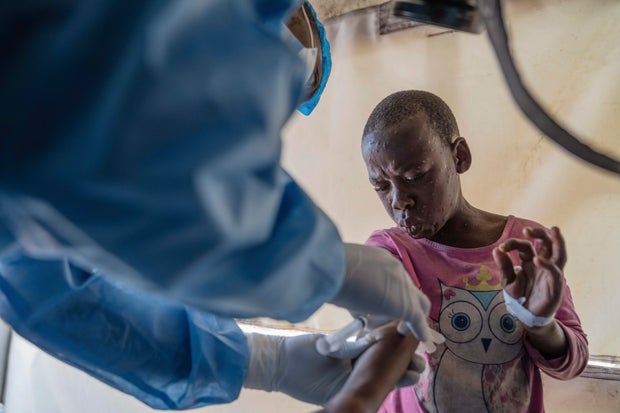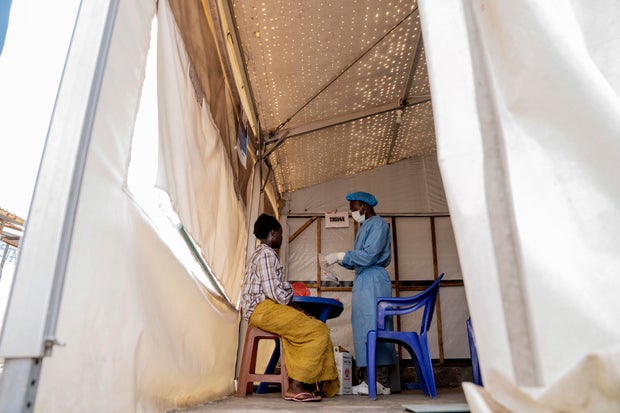CBS News
Congo finally begins mpox vaccinations in a drive to slow outbreaks

Congolese authorities began vaccination against mpox on Saturday, nearly two months after the disease outbreak that spread from Congo to several African countries and beyond was declared a global emergency by the World Health Organization.
The 265,000 doses donated to Congo by the European Union and the U.S. were rolled out in the eastern city of Goma in North Kivu province, where hospitals and health workers have been overstretched, struggling to contain the new and possibly more infectious strain of mpox.
Congo, with about 30,000 suspected mpox cases and 859 deaths, accounts for more than 80% of all the cases and 99% of all the deaths reported in Africa this year. All of the Central African nation’s 26 provinces have recorded mpox cases. Officials in Congo previously told CBS News that they’ve struggled to diagnose patients and provide basic care in the vast country of 100 million people, where a fragile, under-resourced healthcare system is also burdened by the stigma associated with the virus.
Although most mpox infections and deaths recorded in Congo are in children under age 15, the doses being administered are only meant for adults and will be given to at-risk populations and front-line workers, Health Minister Roger Kamba said this week.
“Strategies have been put in place by the services in order to vaccinate all targeted personnel,” Muboyayi ChikayaI, the minister’s chief of staff, said as he kicked off the vaccination.
Moses Sawasawa / AP
At least 3 million doses of the vaccine approved for use in children are expected from Japan in the coming days, Kamba said.
Mpox, also known as monkeypox, had been spreading mostly undetected for years in Africa before the disease prompted the 2022 global outbreak that saw wealthy countries quickly respond with vaccines from their stockpiles while Africa received only a few doses despite pleas from its governments.
However, unlike the global outbreak in 2022 that was overwhelmingly focused on gay and bisexual men, mpox in Africa is now being spread via sexual transmission as well as through close contact among children, pregnant women and other vulnerable groups, Dr. Dimie Ogoina, the chair of WHO’s mpox emergency committee, recently told reporters.
More than 34,000 suspected cases and 866 deaths from the virus have been recorded across 16 countries in Africa this year. That is a 200% increase compared to the same period last year, the Africa Centers for Disease Control and Prevention said.
A lack of diagnostic materials and basic medicines to treat the virus, which can improve survival rates, have also hampered efforts to contain the outbreak, and access to vaccines remains a challenge.
Moses Sawasawa / AP
The continent of 1.4 billion people has only secured a commitment for 5.9 million doses of mpox vaccines, expected to be available from October through December, Dr. Jean Kaseya, head of the Africa CDC, told reporters last week. Congo remains a priority, he said.
At the vaccination drive in Goma, Dr Jean Bruno Kibunda, the WHO representative, warned that North Kivu province is at a risk of a major outbreak due to the “promiscuity observed in the camps” for displaced people, as one of the world’s biggest humanitarian crisis caused by armed violence unfolds there.
The news of the vaccination program brought relief to many in Congo, especially in hospitals that had been struggling to manage the outbreak. Doctors with several charities working in the country have told CBS News they’re overstretched and short on supplies, even having to use tents and mattresses on the floor of makeshift isolation wards to treat a constant influx of patients.
“If everyone could be vaccinated, it would be even better to stop the spread of the disease,” said Dr. Musole Mulambamunva Robert, the medical director of Kavumu Hospital, one of the mpox treatment centers in eastern Congo.
Eastern Congo has been beset by conflict for years, with more than 100 armed groups vying for a foothold in the mineral-rich area near the border with Rwanda. Some have been accused of carrying out mass killings.
CBS News
“Sandwiches of History”: Resurrecting sandwich recipes that time forgot

Barry Enderwick is eating his way through history, one sandwich at a time. Every day from his home in San Jose, California, Enderwick posts a cooking video from a recipe that time forgot. From the 1905 British book “Salads, Sandwiches and Savouries,” Enderwick prepared the New York Sandwich.
The recipe called for 24 oysters, minced and mixed with mayonnaise, seasoned with lemon juice and pepper, and spread over buttered day-old French bread.
Rescuing recipes from the dustbin of history doesn’t always lead to culinary success. Sampling his New York Sandwich, Enderwick decried it as “a textural wasteland. No, thank you.” Into the trash bin it went!
But Enderwick’s efforts have yielded his own cookbook, a collection of some of the strangest – and sometimes unexpectedly delicious – historical recipes you’ve never heard of.
Harvard Common Press
He even has a traveling stage show: “Sandwiches of History Live.”
From the condiments to the sliced bread, this former Netflix executive has become something of a sandwich celebrity. “You can put just about anything in-between two slices of bread,” he said. “And it’s portable! In general, a sandwich is pretty easy fare. And so, they just have universal appeal.”
Though the sandwich gets its name famously from the Fourth Earl of Sandwich, the earliest sandwich Enderwick has eaten dates from 200 B.C.E. China, a seared beef sandwich called Rou Jia Mo.
He declared it delicious. “Between the onions, and all those spices and the soy sauce … oh my God! Oh man, this is so good!”
While Elvis was famous for his peanut butter and banana concoction, Enderwick says there’s another celebrity who should be more famous for his sandwich: Gene Kelly, who he says had “the greatest man sandwich in the world, which was basically mashed potatoes on bread. And it was delicious.”
Whether it’s a peanut and sardine sandwich (from “Blondie’s Cook Book” from 1947), or the parmesian radish sandwich (from 1909’s “The Up-To-Date Sandwich Book”), Enderwick tries to get a taste of who we were – good or gross – one recipe at a time.
RECIPE: A sophisticated club sandwich
Blogger Barry Enderwick, of Sandwiches of History, offers “Sunday Morning” viewers a 1958 recipe for a club sandwich that, he says, shouldn’t work, but actually does, really well!
MORE: “Sunday Morning” 2024 “Food Issue” recipe index
Delicious menu suggestions from top chefs, cookbook authors, food writers, restaurateurs, and the editors of Food & Wine magazine.
For more info:
Story produced by Anthony Laudato. Editor: Chad Cardin.
CBS News
The cream of the crop in butter

Watch CBS News
Be the first to know
Get browser notifications for breaking news, live events, and exclusive reporting.
CBS News
Baking an ancient bread in Tennessee

Watch CBS News
Be the first to know
Get browser notifications for breaking news, live events, and exclusive reporting.










